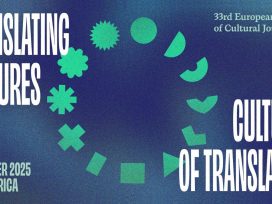Translating cultures – Cultures of translation. 33rd European Meeting of Cultural Journals
The 33rd European Meeting of Cultural Journals took place from 7–9 November 2025 in the Slovenian–Italian cities of Nova Gorica/Gorizia, a ‘borderless’ European Capital of Culture in 2025. The conference was co-organized with Razpotja magazine.
Taking its lead from the cities’ bilingual and bi-national identities, the conference returned to an idea at the core of the Eurozine project: translation as means for the formation of a transnational public sphere.
When Eurozine met in Belgrade back in 2003 to discuss Europe and the Balkans: Politics of Translation, the political dimensions of translation emerged in sharp focus. With the violent collapse of the Yugoslav state fresh in the memory, and the discursive turn enjoying a second wind, translation seemed to be a ‘central metaphor of our time’. Translation was understood as ‘intercultural praxis’; as engagement with difference that avoided the pitfalls of identitarian essentialism.
Over two decades later, does that understanding still resonate? When the rationalist faith in public spheres has been shaken to the core, can translation still serve as a metaphor of social progress? Is a more utilitarian definition called for in an era of culture wars, nationalist revanchisms and authoritarian throwbacks, of linguistic homogenization and technological hyper-acceleration? Or do precisely these things require a radical critique of identity – one rooted in theories of language and textuality, as was the case against the backdrop of the wars of the ’90s and early 2000s?
In Nova Gorica/Gorizia, the Eurozine network reassessed translation’s role in the formation of a transnational public sphere. Our aim was to explore how translation, understood in both a figurative and functional sense, can help us negotiate the present moment. Panels ranged from the literary and linguistic aspects of translation in relation to cultural power and ideology, to questions about the impact of artificial intelligence on the practice of translation as well as transnational cultural discourse more broadly.
The keynote and panels and were open to the public.
Programme
FRIDAY 7 NOV
KEYNOTE 18:00–19:30
Marci Shore
Encounters in the borderlands: Translation and the possibilities and impossibilities of understanding in a dystopian world
SATURDAY 8 NOV
PANEL 1 09:30–11:00
Directions of travel: Literary translation and cultural power
This panel brought together literary translators, cultural theorists and journal editors to discuss how relationships of cultural power are not just reflected in but also challenged by practices of literary translation. Starting with wider questions about literature and cultural power, the discussion moved to concrete examples of hegemonic and counter-hegemonic translation.
Panelists: Kateryna Botanova, Jordan Elgrably, Erica Johnson Debeljak
Moderator: Ann Ighe
PANEL 2 11:30–13:00
Cultures within limits: Minority languages and translation
This panel explored how multilingual polities negotiate relations between minority and majority languages, and the role of translation in these processes. Taking Nova Gorica’s multilingual identity as a starting point, cultural journalists and linguists discussed issues around language rights, representation and protection in a range of minority-majority constellations.
Panelists: Elin Haf Gruffydd Jones, Marco Stolfo, Sofiya Zahova
Moderator: Martina Kafol
PANEL 3 14:30–16:00
Tyranny in translation: The transfer of authoritarianisms
The concept of translation can be used to understand processes through which political ideas, ideologies and practices migrate. Bringing together historians and journalists, this panel explored the ‘translation’ of authoritarian politics at regional and global levels. The aim was not to compare authoritarianisms in the abstract but to identify concrete and organic processes of transfer and exchange.
Panelists: Stefano Bottoni, Hamit Bozarslan, Marci Shore
Moderator: Luka Lisjak Gabrijelčič
PANEL 4 16:30–18:00
Transnational public spheres in the age of AI: Translation and technological change
Neural machine translation wouldn’t exist without access to the work of translators. But how are AI translation tools altering the function of translation? How is the ubiquity of AI impacting on the formation of transnational publics? And how is AI’s ‘revolutionization’ of translation impacting the ethics of cultural content creation? Translators and researchers offered answers to these questions, drawing conclusions for cultural journals in particular.
Panelists: Florian Cramer, Claudia Hamm, Tanja Petrič
Moderator: Igor Harb
SUNDAY 9 NOV
Internal sessions for Eurozine partners.
Biographies
Kateryna Botanova: Cultural critic, writer & curator, Basel & Kyiv
Stefano Bottoni: Historian & Associate Professor, University of Florence
Hamit Bozarslan: Historian, political scientist & Director of Studies, Center for Turkish, Ottoman, Balkan and Central Asian Studies, Ecole des hautes études en sciences sociales, Paris
Florian Cramer: Practice-oriented Research Professor, Artistic Research and Emerging Forms of Cultural Production, Willem de Kooning Academy, Rotterdam
Jordan Elgrably: Writer, translator & Editor-in-Chief, Markaz Review, Montpellier & California
Elin Haf Gruffydd Jones: Professor of Linguistic Diversity and Creative Industries & Director of Centre for Advanced Welsh and Celtic Studies, University of Wales
Claudia Hamm: Literary translator, author & theatre director, Berlin
Igor Harb: Translator & film critic, Ljubljana
Ann Ighe: Historian, Editor-in-Chief, Ord&Bild, Gothenburg, & Editorial Board member, Eurozine
Erica Johnson Debeljak: Writer, translator & columnist, Ljubljana
Martina Kafol: Author & translator, Trieste
Luka Lisjak Gabrijelčič: Editor-in-Chief, Razpotja, Nova Gorica, & Editorial Board member, Eurozine
Tanja Petrič: Literary translator, literary critic, President of the Slovenian Association of Literary Translators & Editor, Sodobnost, Ljubljana
Marci Shore: Chair in European Intellectual History, Munk School for Global Affairs and Public Policy, University of Toronto & Advisory Board member, Eurozine
Marco Stolfo: Historian of Political Thought & Minority Languages Expert, University of Udine
Sofiya Zahova: Director of Vigdís International Centre for Multilingualism and Intercultural Understanding, UNESCO C2C, University of Iceland

